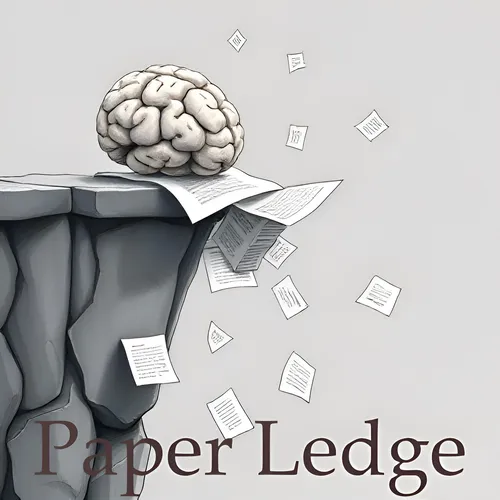Artificial Intelligence - Building Self-Evolving Agents via Experience-Driven Lifelong Learning A Framework and Benchmark
- Author
- ernestasposkus
- Published
- Wed 27 Aug 2025
- Episode Link
- https://www.paperledge.com/e/artificial-intelligence-building-self-evolving-agents-via-experience-driven-lifelong-learning-a-framework-and-benchmark/
Hey PaperLedge crew, Ernis here, ready to dive into some fascinating research! Today, we're talking about building AI that can truly learn and adapt throughout its entire existence. Think less about a robot that can only fold laundry, and more about an AI that can go to college, learn new skills, and figure out life, just like you and me.
The paper we're unpacking introduces something called Experience-driven Lifelong Learning (ELL). In simple terms, it's a framework for creating AI agents that don't just perform specific tasks, but actually grow and evolve by interacting with the world. Imagine teaching a dog new tricks – that's task-specific. This is about teaching a dog to learn how to learn new tricks, and then apply those learning skills in all aspects of its doggy life!
ELL is built on four core ideas:
- Experience Exploration: This is all about the AI getting out there and doing things. It's not just passively receiving information; it's actively exploring environments and learning from the consequences. Think of it like a child constantly asking "why?" and experimenting to see what happens.
- Long-term Memory: The AI needs to remember what it's learned! It's not just about short-term recall, but about building a structured, persistent memory of experiences, knowledge, and even common sense. It’s like building a personal Wikipedia inside the AI’s brain.
- Skill Learning: This is where the AI starts to identify patterns in its experiences and turn them into reusable skills. Imagine learning to ride a bike – once you've mastered it, you can apply those balance and coordination skills to other activities, like riding a scooter. The AI does the same thing, constantly refining and validating its skills.
- Knowledge Internalization: This is the coolest part! It's about turning explicit knowledge into intuition. Think of driving a car – at first, you're consciously thinking about every step. But eventually, it becomes second nature. The AI aims to do the same, turning learned experiences into automatic, intuitive capabilities.
Now, to test this ELL framework, the researchers created a simulated environment called StuLife. Get this, it's a virtual college experience for AI agents! It simulates everything from enrolling in classes to navigating social situations and developing personal skills. It’s like The Sims, but for AI education.
StuLife is designed to push AI in three key ways:
- From Passive to Proactive: The AI needs to be an active learner, not just a passive recipient of information.
- From Context to Memory: The AI needs to rely on its long-term memory, not just the immediate context, to make decisions.
- From Imitation to Learning: The AI needs to truly understand and internalize concepts, not just mimic behavior.
In this virtual college world, the AI agent has to juggle academics, social life, and personal growth, all while remembering past experiences and applying learned skills. It's a challenging environment that really tests an AI's lifelong learning abilities.
The researchers used StuLife to evaluate existing AI models, including Large Language Models (LLMs) we talk about frequently on PaperLedge. They also looked at how important "context engineering" is for making progress toward Artificial General Intelligence (AGI) – that is, AI that can perform any intellectual task that a human being can.
So, why does all of this matter? Well, it could lead to AI that's much more adaptable, resilient, and capable of solving complex problems in the real world. Think about AI that can:
- Continuously learn and adapt in dynamic environments, like autonomous robots exploring unknown terrains.
- Provide personalized education and training that adapts to individual learning styles.
- Develop new scientific discoveries by identifying patterns and insights from vast amounts of data.
This research has implications for pretty much everyone! For educators, it offers insights into how AI can personalize learning. For engineers, it provides a framework for building more robust and adaptable AI systems. And for society as a whole, it raises important questions about the future of AI and its role in our lives.
Here are a few questions that popped into my head while reading this paper:
- If AI can learn and adapt like a human, should it also have a virtual “conscience” or ethical framework built in?
- How can we ensure that AI's "second nature" skills are aligned with human values and goals?
- Could simulated environments like StuLife eventually replace or augment traditional education for humans?
That's all for this episode, folks! Let me know what you think about lifelong learning AI and the idea of AI going to college. I'm eager to hear your thoughts!
Credit to Paper authors: Yuxuan Cai, Yipeng Hao, Jie Zhou, Hang Yan, Zhikai Lei, Rui Zhen, Zhenhua Han, Yutao Yang, Junsong Li, Qianjun Pan, Tianyu Huai, Qin Chen, Xin Li, Kai Chen, Bo Zhang, Xipeng Qiu, Liang He
